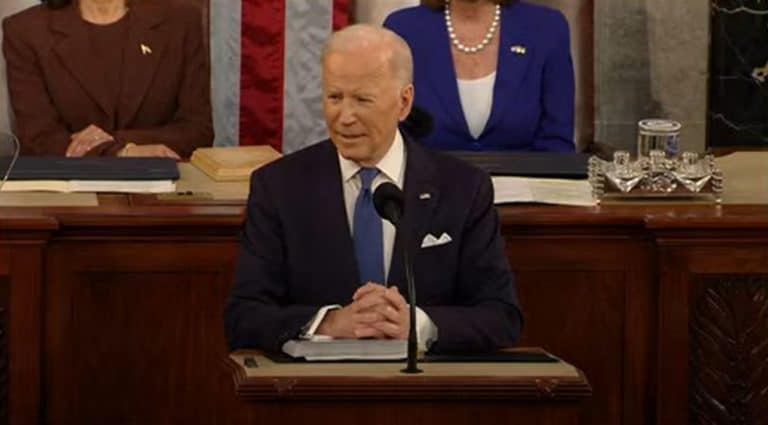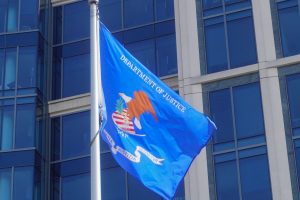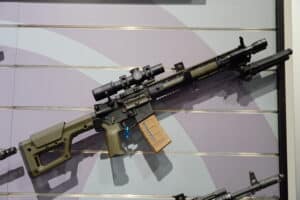President Joe Biden tripled down on using the ATF to try and tighten America’s gun restrictions. His first two tries have faired poorly. Will the latest do any better?
On Thursday, the Biden Administration announced a new ATF rule proposal. This time, the administration is targeting used gun sales. It aims to force more Americans to obtain federal licenses to deal guns or face fines and jail time.
In August 2022, President Biden unilaterally banned “ghost gun” kits. By July 2023, it was stuck down by a federal court. It remains in effect thanks to an emergency stay issued by the Supreme Court, but the rule is facing an uphill legal battle.
In January 2023, the Biden Administration reclassified pistol-brace-equipped guns to make them illegal to own unless registered with the ATF. Only a tiny percentage of Americans complied despite the agency waiving the tax associated with registration. By August 2023, a Fifth Circuit Court of Appeals panel found the rule unlawful.
There’s also the bump stock ban. Former President Donald Trump implemented that, but it was defended in court by the Biden Administration. Unsuccessfully, it should be noted. By April 2023, two federal appeals courts had found it unconstitutional.
These rulings all followed the same basic logic. The ATF exceeded its authority under the law, and it was too inconsistent in applying the law to expect regular citizens to understand and be held to the rules it tried to enact.
The new gun dealer rule is likely vulnerable to the same line of legal attack.
The White House outlined the heart of the new rule pretty well in its release announcing it. It details a series of factors that would require somebody to obtain a Federal Firearm License (FFL) before selling guns. The White House said falling under even one of these could make selling a firearm without a license illegal.
“Offer for sale any number of firearms and also represents to potential buyers that they are willing and able to purchase and sell them additional firearms;” “Repetitively offer for sale firearms within 30 days after they were purchased; Repetitively offer for sale firearms that are like new in their original packaging; Repetitively offer for sale multiple firearms of the same make and model; or as a formerly federally-licensed firearms dealer, sell firearms that were in the business inventory and not transferred to a personal collection at least a year before the sale, addressing the so-called’ fire sale loophole.'”
Although, the rule itself adds some significant caveats to that list. Indeed, some of those exceptions could be read to swallow the guidelines whole.
“[W]hile selling large numbers of firearms or engaging or offering to engage in frequent transactions may be highly indicative of business activity, neither the courts nor the Department has recognized a set minimum number of firearms purchased or resold that triggers the licensing requirement,” the agency wrote in its proposed rule. “Similarly, there is no minimum number of transactions that determines whether a person is ‘engaged in the business’ of dealing in firearms. Instead, the established approach for determining whether an individual is ‘engaged in the business’ is to look at the totality of circumstances. Thus, even a single firearm transaction, or offer to engage in a transaction, when combined with other evidence, may be sufficient to require a license.”
So, how does that square with what federal law says on the topic? Well, the applicable law says dealers need to get an FFL, and a dealer is “any person engaged in the business of selling firearms at wholesale or retail[.]”
It goes on to define the key aspect of being “engaged in the business,” too. That would be somebody “who devotes time, attention, and labor to dealing in firearms as a regular course of trade or business to predominantly earn a profit through the repetitive purchase and resale of firearms[.]” However, it notes that doesn’t apply to somebody “who makes occasional sales, exchanges, or purchases of firearms for the enhancement of a personal collection or for a hobby, or who sells all or part of his personal collection of firearms[.]”
So, many of the base-level requirements may fit the bill. But there are clearly some problems with the vague parts of the proposal. The idea that somebody who has only sold one used gun (or none at all, depending on their intentions) can be charged for not having a dealer’s license seems especially vulnerable to legal challenges. The same is probably true for offering to sell somebody guns again at some point, depending on the circumstance.
And then there’s the issue of the ATF trying to give itself power beyond what it has actually laid out in the rule. They’ve done that in the previous rules, and it’s present here too.
“The activities set forth in these rebuttable presumptions are not exhaustive of the conduct that may show that, or be considered in determining whether, a person is engaged in the business of dealing in firearms,” the ATF wrote in its rule.
However, there are a few reasons to think this rule could fare better than the others.
To start, it’s not as aggressive as the previous rules. It primarily seeks to codify positions the ATF has long held on who needs to get a license to sell guns. They’ve warned selling even one used gun could require an FFL since at least the Obama Administration. And, despite gun-control groups characterizing the rule as closing loopholes, the same requirements outlined in the proposal have always applied at gun shows, online, or anywhere else somebody deals guns as a business.
Unlike the previous rule proposals, this one comes on the heels of Congress taking action in the area. As part of the 2022 Bipartisan Safer Communities Act, lawmakers removed the reference to making a “livelihood” from the definition of what it means to be “engaged in the business.” That leaves some, if not much, room for the ATF to recalibrate its approach to licensing.
Also, there are some court cases dating back to the 1970s where people have been convicted of dealing without a license for some of the reasons outlined in the ATF’s rule. United States v. Gross, United States v. Huffman, and United States v. Wilkening show judges concluded somebody could be required to obtain an FFL if they repeatedly bought and sold several guns for profit or other financial gain in a short period. The sales weren’t the seller’s primary source of income and sometimes didn’t generate much profit (with Wilkening making just $350 in his 1973 case.)
Of course, Congress’s language change was pretty limited. And the federal courts are more skeptical of both the administrative state and government efforts to restrict guns than they were in the 1970s. So, judges today may not come to the same conclusions.
Plus, the initial proposals from the ATF on the “ghost gun” and pistol brace bans were also relatively modest. But they both changed significantly after overwhelmingly negative comments from the industry and the public. And those changes pushed the boundaries of the agency’s power even further into
So, even if the initial dealer license proposal is more modest than the final versions of Biden’s other rules, it probably won’t stay that way. Attempts to push the ATF’s power to decide who needs a license to sell used guns will put the proposal into an ever-worsening legal position.







3 Responses
Happy Labor Day Stephen,
Reading this I am wondering what their purpose is with this rule change. Is there a measurable uptick in private sales to criminals that would be addressed by this rule? By doing this would they be able to prevent straw sales let’s say or net buyers avoiding background checks? It seems to me just about all of the guns used in mass shootings were obtained from FFL holders with all of the required background checks and forms. So what is to be gained except hassling otherwise law abiding people?
Yea, that’s the key to the long-running debate over universal background checks. Advocates say it’s necessary to prevent criminals from buying guns. Detractors argue it won’t have a significant effect on crime and may lead to a national registry.
Congress won’t pass a universal background check bill. So, this is the Biden Administration’s attempt to try and push as many people as possible to get FFLs because then they’d have to perform background checks on sales (in addition to lots of other things). Of course, much of what’s in this rule seems to be in line with what the ATF has been saying about who needs an FFL for years. So, I don’t know what the practical effect will be if it has any effect at all considering it’s likely to face stiff legal challenges.
The ultimate goal of this latest executive power grab is far more sweeping than simply crafting a bureaucratic substitute for universal background checks. And it can’t be fairly evaluated without considering the Biden ATF’s campaign to dramatically reduce the number of federally licensed dealers. Once again, D.C. and California are revealing: force all (or as many as possible) gun transfers through 01 FFLs and then make it impossible for private FFLs to stay in business, leaving the government as the sole source for guns.